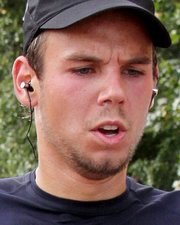Before he received his pilot’s license or achieved his dream of flying passenger jets, the co-pilot of the crashed Germanwings jetliner was so troubled that he underwent treatment for “suicidal tendencies,” a prosecutor said Monday, raising questions about what the airline should have known about his condition.
The co-pilot, Andreas Lubitz, was at the controls last week as the Airbus A320 jet dived from cruising altitude to smash into the French Alps, killing all 150 people onboard. French officials said the crash appeared to have been no accident, but an intentional act on the part of Mr. Lubitz.
Mr. Lubitz, 27, had been treated by psychotherapists “over a long period of time,” the public prosecutor’s office in Düsseldorf said in a statement on Monday, without providing specific dates. In follow-up visits to doctors since that time, the prosecutor said, “no signs of suicidal tendencies or aggression toward others were documented.”
Under current German law that emphasizes privacy, it was up to Mr. Lubitz to disclose his history to doctors examining his fitness to fly, according to Roland Quast, medical director of Aeromedical Center Germany in Stuttgart.
“What is decisive is that the pilot tells the truth,” he said. “If he lies, we don’t have lie detectors.”
Mr. Lubitz’s medical history has raised questions over how much leeway medical professionals should have to inform the authorities about patients in positions that could affect public safety. Parliamentary deputies from Germany’s governing coalition have called for doctors to break confidentiality when a patient shows suicidal tendencies. Karl Lauterbach, a Social Democrat and a medical expert, told the daily newspaper Bild that if lives could be endangered, “the doctor has a duty to inform the employer about the unsuitability of the employee to do his work.”
That applies “especially in the case of psychiatric illness and the possible danger of suicide,” he said.
Heinz Joachim Schöttes, a spokesman for Germanwings, said Monday that the airline was aware of the prosecutor’s statement about Mr. Lubitz but declined to comment.
Emerging picture of the Germanwings co-pilot Andreas Lubitz, according to the police, prosecutors and airline officials:
Had been treated for “suicidal tendencies” before receiving pilot’s license.
Was treated by psychiatrists “over a long period of time.”
Interrupted his pilot training for months, for undisclosed reasons.
Had a mental illness but kept it hidden from the airline.
Had antidepressant drugs in his apartment.
Also sought treatment for vision problems.
Prosecutors have questioned many of Mr. Lubitz’s friends and colleagues, but have found no indication of a suicide note or a clear motive behind the crash. “In particular, there continues to be no verifiable warning of such an act nor has any claim of responsibility been found,” the Düsseldorf prosecutor’s office said in a statement.
Investigators had found no one close to him, whether personally or professionally, who was able to name “any special situation that could serve as a viable indication of a possible motive,” the statement said.
And Dr. Quast, who leads a panel that advises the German government on difficult pilot-fitness cases but has not reviewed Mr. Lubitz’s records, said it was possible that the co-pilot did tell doctors about his history and that they had concluded “that the problem was over.”
According to friends and acquaintances, Mr. Lubitz was focused from his youth on the single goal of becoming an airline pilot, and began flying gliders when he was 14. He was accepted into Lufthansa’s prestigious flight school after graduating from high school, and received training in the German city of Bremen and in Arizona.
On Thursday, Carsten Spohr, the chief executive of Lufthansa, said at a news conference that Mr. Lubitz had passed the company’s health checks with “flying colors” and “was 100 percent flightworthy, without any limitations.”
Investigators from Germany, France and beyond are facing the difficult task of determining what motivated Mr. Lubitz — issues in his personal life, perhaps, or recent trouble with his eyesight that may have threatened his career. Mr. Lubitz’s medical records show no physical illnesses, the prosecutor said, an apparent reference to his vision problems, which officials said might have been psychosomatic in nature.
Investigators from Germany, France and beyond are facing the task of determining what motivated Andreas Lubitz. Credit Kai Pfaffenbach/Reuters
The announcement by prosecutors on Monday suggests that they believe his mental health problems could well have played a significant role in the crash.
Germanwings Flight 9525 was on its way to Düsseldorf from Barcelona, Spain, when Mr. Lubitz apparently put it on its fatal course, a French prosecutor has said. Voice recordings from the flight indicate that Mr. Lubitz was alone in the cockpit, and refused to allow the captain to re-enter as the plane lost altitude.
Law enforcement officials in Germany have mobilized in force to deal with the complex case presented by the crash. More than 200 officers from the Düsseldorf police have worked on what they are calling Special Commission Alps. Roughly 100 officers remain involved in the effort to identify the victims and get to the bottom of how and why they died. Two French airplane crash experts are in Germany cooperating with the Düsseldorf commission.
“Since the clues accumulated that the crash could have been premeditated, we have formed a murder commission with 50 specialized investigators,” the Düsseldorf police said in a statement.
Searches of Mr. Lubitz’s apartment and his parents’ house in Montabaur, Germany, on Thursday yielded evidence that was still being analyzed.
Officers are also visiting the homes of victims to take DNA samples and fingerprints to aid in the identification of the dead. The physical evidence is being evaluated by the German Federal Criminal Police. The process could take months to complete, in part because of how thoroughly the plane was destroyed on impact and how difficult it has been to reach and comb the rugged crash site.
With clouds closing in on the area Monday, helicopters were grounded, and search teams and police investigators had to hike up the mountain on foot instead. At the same time, crews worked to open a road through the forest to the site, hoping to speed the painstaking labor of collecting debris from the aircraft and the remains of the dead.















